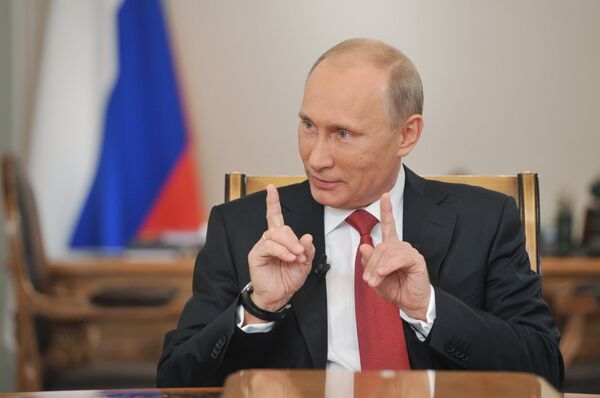In his interview with the heads of three major Russian TV networks, Prime Minister Vladimir Putin laid out the key elements of his political ideology. Not only did he explain why he is returning to the Kremlin, he suggested that any other choice could be dangerous to the country. Essentially, the deal Putin is offering Russians is votes in exchange for stability.
Putin cited examples of other long-serving politicians, like Franklin Delano Roosevelt, who was elected president of the United States four times (he offered his own New Deal to voters); Helmut Kohl, who was the German chancellor for 16 years; and French President Charles de Gaulle.
Ideas are most convincing when expressed as an argument, and Putin offered his argument against his left- and right-wing critics.
First, he called on the electorate not to lose heart, promising that his agreement with President Medvedev to swap places on the ticket does not predetermine the elections' outcome.
Second, he reminded those who would cast their votes for communists and radical left-wing parties that it was the Soviet Communist Party's policies that "led to the downfall and collapse of the country," with rationing instituted for all basic necessities. In a warning to the entire radical opposition Putin said that acting as if "things cannot get any worse" is irresponsible, recalling that this attitude resulted in social upheavals in the late 1980s and early 1990s.
Third, he had a few words for his right-wing opponents. Putin made light of criticism of him in the West ("The hawk is a good bird," he said. "I'm just a human being"), and promised to "make mechanisms of direct democracy work and make sure that people feel connected to the authorities" even if United Russia remains "the leading political force in Russia."
The key elements of Putin's ideology coincide with Dmitry Medvedev's ideas, although there are some minor differences, as Medvedev pointed out during his interview with the same three TV networks two weeks ago.
Medvedev spoke about gradual reforms, such as lowering the election threshold for parties from 7% to 5% in 2016, whereas Putin put the emphasis on stabilization and strengthening the political system. Medvedev said he would like Russia's parliament to represent the entire range of public opinion, whereas Putin stressed his desire to see United Russia win the elections.
Experience shows that there is no dramatic contradiction between the two views, as parliament can be both colorful and manageable. But the number of colors is quite another matter.
Putin's interview revealed that he sees the upcoming elections as an all-or-nothing battle and that he expects the main color to win. Medvedev, who will head the United Russia election list, will have to do his best, and it seems he is fully aware of his challenge. At a meeting with his supporters on Saturday, he said: "I'm United Russia through and through."
Putin said in his interview that United Russia does not seek power for power's sake. He said several times that the party's victory would allow Medvedev as the new prime minister to form "a durable and effective government," which is fully in tune with what Medvedev said at the meeting with his supporters.
The two leaders also see eye to eye on other key issues. First, Putin said that Medvedev and he agreed four years ago that they would propose their "ideas regarding the structure of power" to the public at the end of the president's term. Second, Medvedev and Putin both look down on government reshuffling, having given similar answers to questions about keeping on unpopular ministers.
There are some differences, but they are minor. For example, Medvedev speaks about an "extended government" based on cooperation between different groups in society, while Putin advocates a "durable and effective government" that can be formed only if United Russia wins the elections.
The two leaders also have similar views on foreign policy issues. Putin spoke as a centrist leader, saying that he would continue to defend Russia's national interests, but "it would be a big mistake for us to give ourselves superpower airs."
"We always have and always will carry out a deliberate policy that seeks to facilitate Russia's development. This means that we want to maintain neighborly and friendly relations with all our partners," Putin said, adding that he and his colleagues had always defended Russia's national interests "in a civil manner."
Medvedev - who oversaw the war against Georgia, made progress in relations with NATO at the Lisbon summit, and reset relations with the United States - will definitely agree with his prime minister.
Interviews with the heads of the top three Russian TV networks have become a traditional and highly effective way to address the nation. The media moguls asked Medvedev and Putin why things can't be different in Russia, and the two leaders patiently explained why. Russians listened, while the West grumbled under its breath.
Really, this question - why things can't be different in Russia - could also be addressed to the EU and the United States. While opening its arms to Eastern European countries, the West has not offered Russia a real European future, only the promise of integration in Western institutions.
But Russian voters will have to find their own answers to that and other questions. They must decide if there will be "a significant renewal of the parliament through the United Russia parliamentary party," as Putin has promised, or if renewal should come from elsewhere. There is always a choice, and you don't need to watch interviews with politicians to know that.
The views expressed in this article are the author's and may not necessarily represent those of RIA Novosti.



